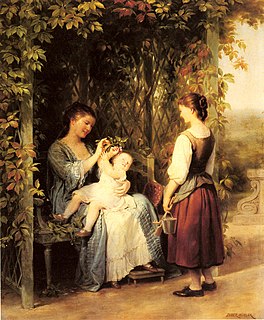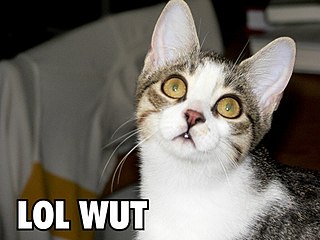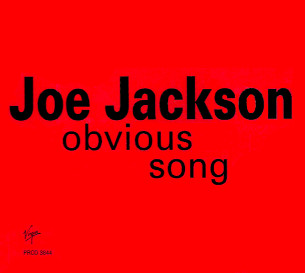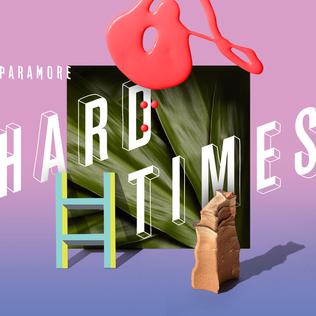
A joke is a display of humour in which words are used within a specific and well-defined narrative structure to make people laugh and is usually not meant to be taken seriously. It takes the form of a story, usually with dialogue, and ends in a punch line. It is in the punch line that the audience becomes aware that the story contains a second, conflicting meaning. This can be done using a pun or other word play such as irony or sarcasm, a logical incompatibility, nonsense, or other means. Linguist Robert Hetzron offers the definition. It takes the form of a story, usually with dialogue, and ends in a punch line. It is in the punch line that the audience becomes aware that the story contains a second, conflicting meaning. This can be done using a pun or other word play such as irony or sarcasm, a logical incompatibility, nonsense, or other means. Linguist Robert Hetzron offers the definition:
A joke is a short humorous piece of oral literature in which the funniness culminates in the final sentence, called the punchline… In fact, the main condition is that the tension should reach its highest level at the very end. No continuation relieving the tension should be added. As for its being "oral," it is true that jokes may appear printed, but when further transferred, there is no obligation to reproduce the text verbatim, as in the case of poetry.

Humour or humor is the tendency of experiences to provoke laughter and provide amusement. The term derives from the humoral medicine of the ancient Greeks, which taught that the balance of fluids in the human body, known as humours, controlled human health and emotion.

Laughter is a physical reaction in humans consisting usually of rhythmical, often audible contractions of the diaphragm and other parts of the respiratory system resulting most commonly in forms of "hee-hee" or "ha-ha". It is a response to certain external or internal stimuli. Laughter can arise from such activities as being tickled, or from humorous stories or thoughts. Most commonly, it is considered an auditory expression of a number of positive emotional states, such as joy, mirth, happiness, relief, etc. On some occasions, however, it may be caused by contrary emotional states such as embarrassment, surprise, or confusion such as nervous laughter or courtesy laugh. Age, gender, education, language, and culture are all indicators as to whether a person will experience laughter in a given situation. Some other species of primate show laughter-like vocalizations in response to physical contact such as wrestling, play chasing or tickling.

Tickling is the act of touching a part of a body in a way that causes involuntary twitching movements or laughter. The word "tickle" (help·info) evolved from the Middle English tikelen, perhaps frequentative of ticken, to touch lightly.
A laugh track is a separate soundtrack for a recorded comedy show containing the sound of audience laughter. In some productions, the laughter is a live audience response instead; in the United States, where it is most commonly used, the term usually implies artificial laughter made to be inserted into the show. This was invented by American sound engineer Charles "Charley" Douglass.

LOL, or lol, is an initialism for laughing out loud and a popular element of Internet slang. It was first used almost exclusively on Usenet, but has since become widespread in other forms of computer-mediated communication and even face-to-face communication. It is one of many initialisms for expressing bodily reactions, in particular laughter, as text, including initialisms for more emphatic expressions of laughter such as LMAO and ROFL or ROTFL. Other unrelated expansions include the now mostly obsolete "lots of luck" or "lots of love" used in letter-writing.

Death from laughter is a rare form of death, usually resulting from either cardiac arrest or asphyxiation, that has itself been caused by a fit of laughter. Instances of death by laughter have been recorded from the times of ancient Greece to modern times.

Present Laughter is a comic play written by Noël Coward in 1939 but not produced until 1942 because the Second World War began while it was in rehearsal, and the British theatres closed. The title is drawn from a song in Shakespeare's Twelfth Night that urges carpe diem. The play has been frequently revived in Britain, the US and beyond.
Wendy Rene was the stage name of soul singer and songwriter Mary Frierson, later Mary Cross. She recorded for Stax Records in the mid 1960s.

"Laughter in the Rain" is a song composed and recorded by Neil Sedaka, with lyrics by Phil Cody. It includes a 20-second saxophone solo by Jim Horn.

Laughter in Paradise is a British comedy film released in 1951. The film stars Alastair Sim, Fay Compton, George Cole and Guy Middleton. The film was remade as Some Will, Some Won't (1970).
"Let's Have a Party" is a 1957 song written by Jessie Mae Robinson and recorded by Elvis Presley for the movie Loving You. It was released as a single in the United Kingdom under the title "Party" and peaked at #2 in the UK Singles Chart. Wanda Jackson recorded the song for her first album, Wanda Jackson, released in 1958. The song was released as a single by Jackson in 1960 and entered the UK chart on 1 September of that year, spending eight weeks there and reaching #32; it also reached #37 on the Billboard Hot 100 in 1960. The Jackson version was later featured in the 1989 film Dead Poets Society. Paul McCartney also recorded and released the song on his 1999 Run Devil Run album. His original song "Run Devil Run", on the album of the same name, also has a similar melody. A cover of "Let's Have a Party" by Sonia was included on the 2010 remastered edition of her 1989 album Everybody Knows.
Comedy is a genre of fiction consisting of discourses or works intended to be humorous or amusing by inducing laughter, especially in theatre, film, stand-up comedy, television, radio, books, or any other entertainment medium. The term originated in Ancient Greece: in Athenian democracy, the public opinion of voters was influenced by political satire performed by comic poets in theaters. The theatrical genre of Greek comedy can be described as a dramatic performance pitting two groups or societies against each other in an amusing agon or conflict. Northrop Frye depicted these two opposing sides as a "Society of Youth" and a "Society of the Old." A revised view characterizes the essential agon of comedy as a struggle between a relatively powerless youth and the societal conventions posing obstacles to his hopes. In this struggle, the youth is constrained by his lack of social authority, and is left with little choice but to resort to ruses which engender dramatic irony, which provokes laughter.

"Obvious Song" is a song by British singer-songwriter and musician Joe Jackson, released in 1991 as the second single from his ninth studio album Laughter & Lust. It was written by Jackson, and produced by Jackson and Ed Roynesdal. The song's music video was directed by Marcus Nispel and produced by Marc Rosenberg.
"Fake Happy" is a song by American rock band Paramore. It was released on August 29, 2017 through Fueled by Ramen as the third single off their fifth studio album After Laughter (2017). Written by lead vocalist Hayley Williams and guitarist Taylor York and produced by Justin Meldal-Johnsen and York, the song was recorded in the band's hometown, Nashville, Tennessee.

"Hard Times" is a song by American rock band Paramore from their fifth studio album After Laughter. It was released on April 19, 2017, through Fueled by Ramen as the album's lead single. The song was written by lead vocalist Hayley Williams and guitarist Taylor York and was recorded in the band's hometown, Nashville, Tennessee. It is the first single to be released by the band since the return of drummer Zac Farro and the departure of former bassist Jeremy Davis.

After Laughter is the fifth studio album by American rock band Paramore. It was released on May 12, 2017, through Fueled by Ramen as a follow-up to Paramore, their 2013 self-titled album. The album was produced by guitarist Taylor York alongside previous collaborator, Justin Meldal-Johnsen. It is the band's first album since the return of drummer Zac Farro, who left the band with his brother Josh in 2010, and the departure of former bassist Jeremy Davis, who left the band in 2015. After Laughter represents a complete departure from the usual pop punk and alternative rock sound of their previous releases. The album touches on themes of exhaustion, depression and anxiety, contrasting the upbeat and vibrant sound of the record.

Adedamola Adefolahan, known professionally as Fireboy DML, is a Nigerian singer and songwriter. He is signed to YBNL Nation, an independent record label founded by Nigerian rapper Olamide. His debut studio album Laughter, Tears and Goosebumps was released in 2019. He won Listener's Choice and was nominated for Song of the Year for "Jealous" at the 2020 Soundcity MVP Awards Festival.
Laughter at the World's End is a Japanese manga series written and illustrated by Yellow Tanabe. It was serialized for five chapters in Shogakukan's Weekly Shōnen Sunday manga magazine from November to December 2012. Shogakukan collected the chapters in a single tankōbon volume released in March 2013.













